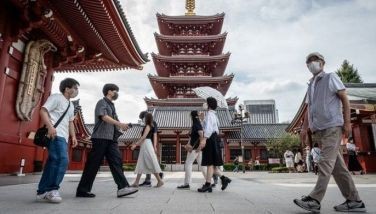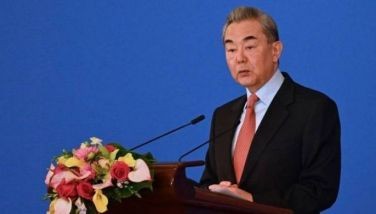Syria warns Jordan over aiding rebels
AMMAN, Jordan (AP) — Syria's regime sternly warned neighboring Jordan on Thursday that it was "playing with fire" by allowing the U.S. and other countries to train and arm rebels on its territory.
Jordan, America's closest ally in the Arab world, has long been nervous that President Bashar Assad's hard-line regime could retaliate for supporting the rebels. The warning carried on state media may add to those jitters, though Jordanian government officials publicly downplayed it as "mere speculation by the Syrian media."
Syrian state television said leaks in U.S. media show Jordan "has a hand in training terrorists and then facilitating their entry into Syria." State radio accused Jordan of "playing with fire."
A front-page editorial in the government daily al-Thawra accused Amman of adopting a policy of "ambiguity" by training the rebels while at the same time publicly insisting on a "political solution" to the Syrian crisis.
"Jordan's attempt to put out the flame from the leaked information will not help as it continues with its mysterious policy, which brings it closer to the volcanic crater," the paper said.
Two Jordanian officials downplayed the diplomatic tiff with Syria. One said Jordan will not discuss the state of relations through the media.
"Such discussions are usually carried out through the appropriate diplomatic channels,' he said. Both officials insisted on anonymity out of concern that their comments may further irritate relations, which have been historically bumpy.
Jordan has long been concerned that the Assad regime could use chemical weapons against it, or that agents linked to the regime or its allied Lebanese militant group Hezbollah could attack the kingdom.
The Syrian warnings appeared to reflect the regime's concerns about statements by U.S. and other Western and Arab officials saying Jordan has been facilitating arms shipments and hosting training camps for Syrian rebels since last October.
The training and the influx of foreign-funded weapons have coincided with rebel gains in southern Syria near the strategic border area with Jordan.
Those gains could be leading up to control of the region along the Jordanian border. That would be a major victory that could offer rebels a staging ground to try to attack the capital Damascus, the seat of Assad's power.
Rebels already control large swathes of territory in northern Syria along the Turkish border.
Activists reported more advances in the south on Thursday.
The rebels receiving training in Jordan are mainly secular Sunni Muslim tribesmen from central and southern Syria who once served in the army and police.
The force is expected to fill a security vacuum — mainly to protect the border with Jordan, assist displaced Syrians and possibly set up a safe haven for refugees — if Assad is toppled.
The Syrians training in Jordan are also envisioned as a counterbalance to the Islamic militant groups that have proven to be among the most effective of the myriad rebel factions fighting Assad's forces on the ground.
Chief among those rebel extremist groups is Jabhat al-Nusra or the Nusra Front, which the U.S. designates as a terrorist group and says is associated with al-Qaida.
The prominence of such extremist groups has fueled fears in Jordan that the chaos in Syria could lead to a failed state where Islamic militants have a free hand.
Israel and the United States also are concerned about militants potentially operating in the area near the Israeli frontier with Syria in the Golan Heights — also in the south — should Assad's regime collapse.
Though Jordan is supporting one segment of the disparate patchwork of rebel groups, it is nevertheless concerned about the recent rebel advances in the south along its border.
One fear is that the fall of the area into rebel hands could unleash lawlessness on the border and provide a haven for Islamic extremist groups such as Nusra Front on its doorstep.
The Islamist rebel groups, particularly Nusra, are complicating the battlefield by thwarting much-needed international aid from countries such as the U.S. that do not want to bolster extremist, jihadi groups.
In the latest fighting in the south, the Britain-based Syrian Observatory for Human Rights said fighters seized most parts of Karak neighborhood in the province of Daraa after several days of fighting.
Daraa province borders Jordan and its provincial capital of the same name was the birthplace of the uprising against Assad two years ago.
There were also heavy clashes reported in the town of Sheik Maskeen, which is on the route from the Jordanian capital Amman to Damascus. Daraa is 115 kilometers (71 miles) south of Damascus.
The Observatory, an anti-regime activist group, also reported clashes at a checkpoint outside a camp for displaced Syrians on the outskirts of the city of Daraa. It said rockets fell inside the camp, but did not say who fired them, or how many people died.
On Wednesday, opposition fighters captured a military base outside the city of Daraa. That victory followed the rebel takeover of Dael, one of the province's bigger towns, and another air defense base in the area late last month.
Their aim is to secure a corridor from the Jordanian border to Damascus in preparation for an eventual assault on the capital. And they have made major progress along the way. Activists say several towns and villages along the Daraa-Damascus route are now in rebel hands.
It is widely believed that the rebels are close to seizing control of the two border posts with Jordan — a significant gain that would bolster arms shipments to the rebels.
In comments distributed Thursday, Assad criticized the recent Arab League decision to give Syria's seat to the opposition, calling it "meaningless theatre."
"This League needs legitimacy itself. It cannot grant legitimacy to others nor withdraw it," he said in an interview with Turkey's TV channel Ulusal Kanal. Excerpts of which were published Wednesday and Thursday and the full interview will be aired Friday.
- Latest
- Trending





























